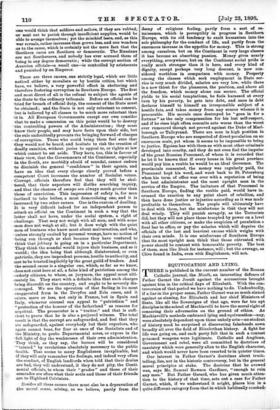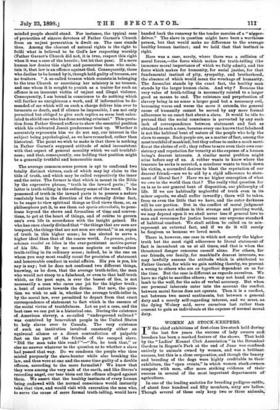EQUIVOCATION AND LYING.
THERE is published in the current number of the Roman Catholic journal, the Month, an interesting defence of Father Garnet the Jesuit against the accusations brought against him in the critical days of Elizabeth. With the con- troversies of that period we have nothing to do. Undoubtedly, if a liar in the proper sense, Father Garnet was as much sinned against as sinning, for Elizabeth and her chief Ministers of State, like all the Sovereigns of that age, were far too apt disciples in the school of Machiavelli to have the moral right of censuring their adversaries on the ground of ethics. As Machiavelli's methods embraced lying and equivocation—nay, were absolutely dependent upon these unholy arts—no student of history need be surprised at discovering falsehoods sown broadly all over the field of Elizabethan history. A fight for life was going on, and each party felt that in such a contest poisoned weapons were legitimate. Catholic and Anglican, Government and rebel, were all committed to doctrines of casuistry which were generally alien to the English character, and which would never have been resorted to in quieter times.
Oar interest in Father Garnet's doctrines about truth- telling, lies, not in the historic controversy, but in the general moral principles at stake. The doctrine that he avowed was, says Mr. Samuel Rawson Gardiner, "enough to ruin any man." But Father Gerard, who has given much atten- tion to the history of that time, sets out a case for Father Garnet, which, if we understand it aright, places him in a quite different category from that in which habitually crooked-
minded people should stand. For instance, the typical case of protection of sincere devotees of Father Garnet's Church from an unjust persecution is dwelt on. The case stands thus. Among the clearest of natural rights is the right to fulfil what is believed to be God's law respecting worship (Father Garnet's Church did not, it is true, respect this right when it was a case of the heretic; but let that pass). If a mere human law denies this right and persecutes those who main- tain it, that law is an offence against God. Consequently, those who decline to be bound by it, though held guilty of treason, are no traitors. "A so-called treason which consists in belonging to the true Church or exercising her ministry is no treason, and one whom it is sought to punish as a traitor for such an offence is an innocent victim of unjust and illegal violence. Consequently, I am bound in conscience to do nothing which will further so unrighteous a work, and if information be de- manded of me which will on such a chars deliver him over to torments or death, and if silence be impossible, I am not only permitted but obliged to give such replies as seem best calcu- lated to shield one who has done nothing criminal." This quota- tion from Father Gerard suffices to show the essential position which his celebrated Jesuit predecessor took up. Whether it accurately represents him we do not say, our interest in the subject being psychological, as we have remarked, rather than historical. The point we wish to make is that there is nothing in Father Garnet's supposed attitude of mind inconsistent with that aspect of general morality which we call truthful- ness; and that, consequently, one holding that position might be a generally truthful and honourable man.
The average common-sense person is apt to confound two totally distinct virtues, each of which may lay claim to the title of truth, and which may be called respectively the inner and the outer. The former is that which is meant in the Bible by the expressive phrase, "truth in the inward parts ; " the latter is truth-telling in the ordinary sense of the word. To be possessed of truth in the inward parts is to possess a nature resolutely bent in the direction of the eternally divine fact, to be eager to view spiritual things as God views them, or, as philosophers put it, to see them sub specie wternitatis, to pene- trate beyond the shows and formalism of time and conven- tions, to get at the heart of things, and of course to govern one's own life in accordance with the insight gained. He who has once clearly divined that "the things that are seen are temporal, the things that are not seen are eternal," is an organ of truth in this higher sense ; he has elected to serve a higher ideal than that of the coarse world. lin ganzen, guten, schonen resold in leben is the ever-persistent motive-power of his life. He by no means neglects or undervalues truth-telling in its ordinary sense ; indeed, he is the one on whom you may most readily count for precision of statement and honourable conduct in social affairs. His yea is yea, his nay is nay ; but he does not confound two different things, knowing, as he does, that the average truth-teller, the man who would not stoop to a falsehood, or even to that half-truth which, as the poet says, is ever the basest of lies, is not neoessarily a man who cares one jot for the higher truth ; a bent of nature towards the divine. But now, the ques- tion we wish to ask is, whether the average truth-teller is, by the moral law, ever permitted to depart from that exact correspondence of statement to fact which is the essence of the social virtue of truthfulness. Let us put a case, and the best case we can put is a historical one. During the existence of American slavery, a so-called "underground railroad" was contrived by benevolent people in the United States to help slaves over to Canada. The very existence of such an institution involved constantly either an equivocal silence or a direct contradiction of palpable fact on the part of the friends of the escaped slave. "Did the man take this road ? "—" No, he took that," or else no answer whatever to the question as to whether a slave had passed that way. Do we condemn the people who thus misled purposely the slave-hunter while also breaking the law, and thus were at one and the same time guilty of a double offence, according to the mere formalist ? We know that they were among the very salt of the earth, and like Sterne's recording angel, our tear blots out the offence alleged against them. We assert that the healthy instincts of every human being endowed with the normal conscience would instantly take that view, and would visit with execration the man who, to serve the cause of mere formal truth-telling, would have
handed back the runaway to the tender mercies of a "nigger- driver." The slave in question might have been a worthless person, but that would make no difference to the average healthy human instinct; and we hold that that instinct is right.
Here was a case, surely, where there was a collision of moral forces,—the force which makes for truth-telling (the immense moral importance of which we fully admit), and the which makes for humanity, for social justice, for that fundamental instinct of pity, sympathy, and brotherhood,. the absence of which would mean the wreckage of humanity._ The formalist stands by the exact fact, the healthy man stands by the larger human claim. And why ? Because the- very value of truth-telling is necessarily related to a larger- good as means to end. The existence and perpetuation of slavery being in no sense a larger good but a necessary evil,. becoming worse and worse the more it extends, the general cause of humanity cannot be served by any mere formal adherence to an exact fact about a slave. It would be idle to pretend that the social conscience is perverted by any such lack of correspondence between statement and fact as- obtained in such a case, because every one knows that falsehood is not the habitual bent of nature of the people who help the slave to escape. Such people are, as a matter of fact, among the most truthful of mankind; but they refuse to make a mock sacri- fice at the shrine of evil ; they refuse to save even their own con- sistency and reputation for veracity at the expense of a human being's dearest interests. A similar moral problem might. arise before any of us. A robber wants to know where the treasure he seeks is secreted, a murderer wants to track down his victim, a scoundrel desires to blast the reputation of our dearest friend,—are we to aid by a rigid adherence to state- ment of literal fact ? Have we no higher conception of what we owe to the world than that ? The really vital question for us is as to our general bent of disposition, our philosophy of life. If we are habitually neglectful of truth even in its minor aspects, we shall suffer inwardly ; there will be taker. from us even the little that we have, and the outer darkness will be our portion. But in the conflict of moral judgment-- which occurs not seldom in this strange and puzzling world, we may depend upon it we shall never lose if general love to man and reverence for justice become our supreme standard of habitual conduct. We shall seldom be called on to mis- represent an external fact, and if we do it will surely be forgiven us because we loved much.
There is, however, one case in which not merely the higher- truth but the most rigid adherence to literal statement of fact is incumbent on us at all times, and that is when the threatened danger concerns oneself alone. For others, for our friends, our family, for mankind's dearest interests, we may lawfully assume the attitude which is attributed to- Father Garnet, for while we gain nothing thereby, we prevent a wrong to others who are ex hypothesi dependent on us for• the time. But the case is different as regards ourselves. We have no right to sacrifice others; we may not hand over the- lamb to the wolf, for the sake of verbal accuracy. But when our personal interests enter into the account the conflict between moral forces does not operate. Then it is a conflict,. not between two moral sentiments, but between a general duty and a merely self-regarding interest, and we must, as the dying Wolsey said, serve ourselves last rather than consent to gain as individuals at the expense of normal moral duty.



































 Previous page
Previous page